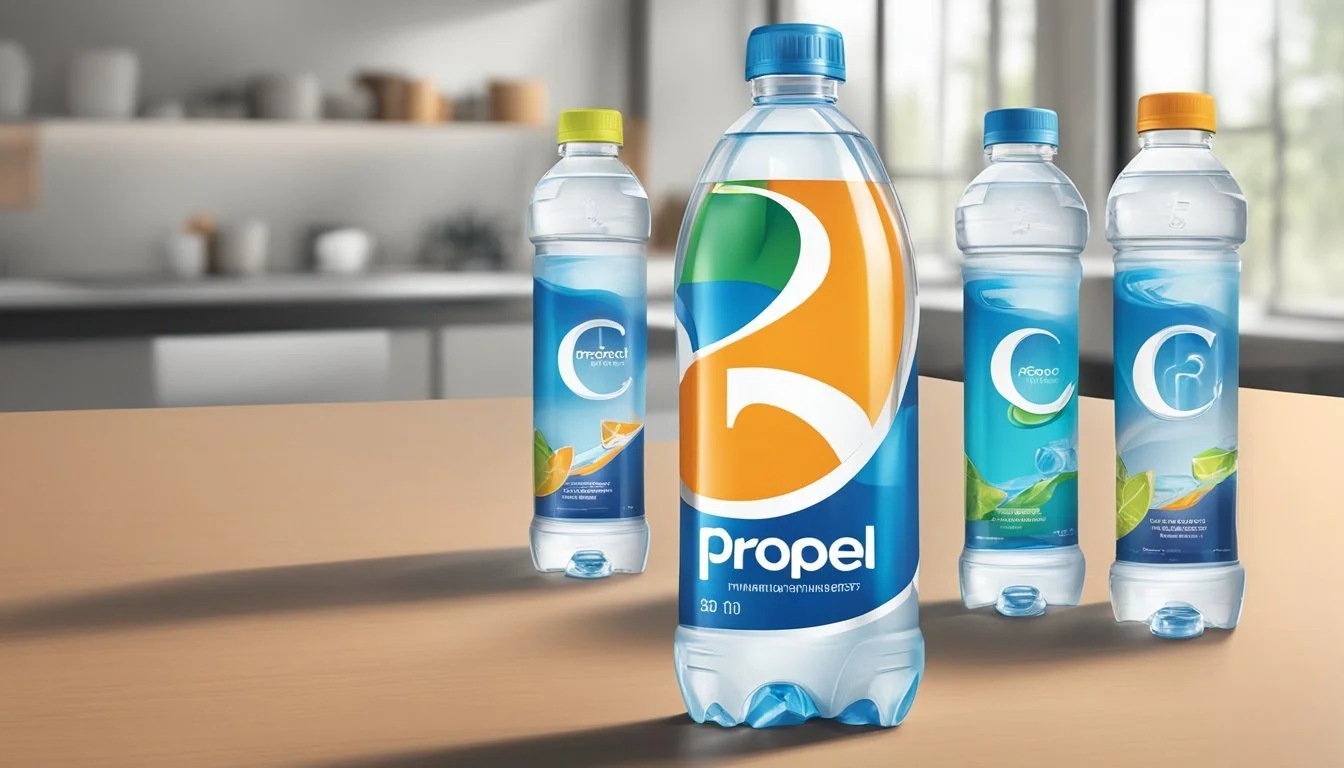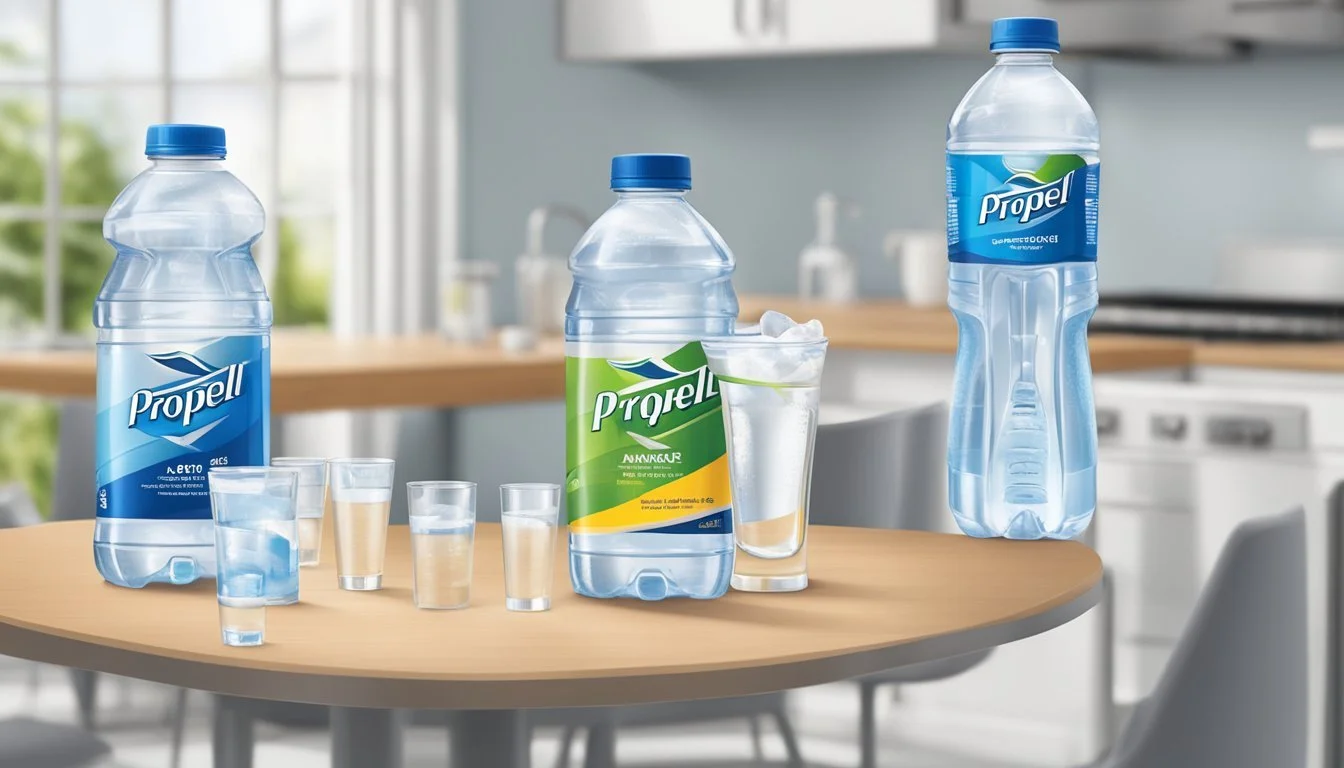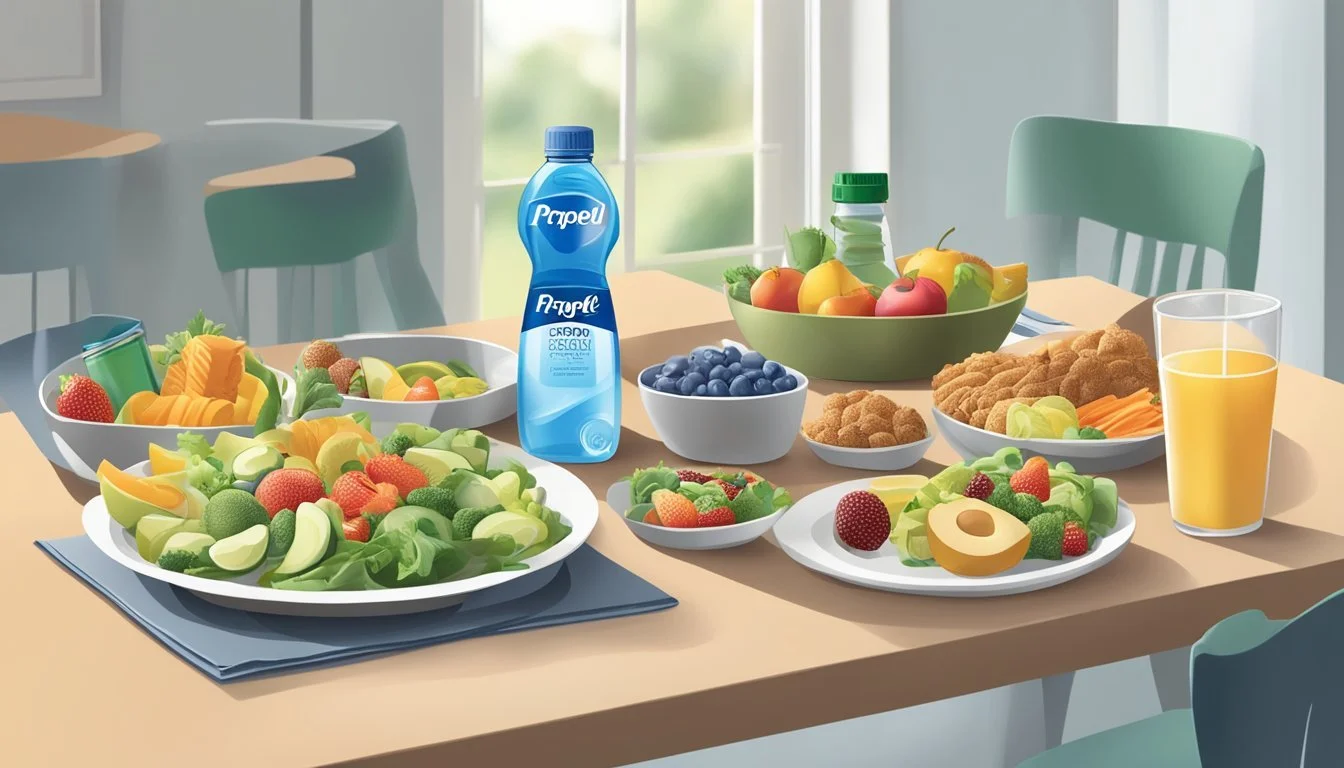How Many Servings of Propel Sports Drinking Water Is Too Much
Expert Insights
Staying hydrated is crucial, especially during intense workouts or hot days. Propel sports drinking water is a popular choice for many, offering zero calories and essential vitamins. Yet, one might wonder about the optimal consumption levels for this beverage.
Experts suggest limiting Propel to avoid excessive sodium intake. While it provides beneficial electrolytes, it's important to monitor daily consumption to prevent surpassing the American Heart Association's recommended sodium limit.
To strike a balance, incorporating Propel in moderation can enhance hydration without overloading on sodium or other additives.
Understanding Propel Sports Drinking Water
Propel Sports Drinking Water is engineered to support hydration with added benefits like vitamins and electrolytes. It stands out due to its zero-calorie content and inclusion of specific nutrients.
Composition of Propel
Propel contains a blend of essential electrolytes, including sodium, potassium, and magnesium, which help support hydration. These electrolytes are crucial during and after intense physical activities.
In addition to electrolytes, Propel is enriched with vitamins such as Vitamin C, Vitamin E, and a B-vitamin complex, including niacin (Vitamin B3), Vitamin B6, and Vitamin B12. These vitamins contribute to energy metabolism and overall well-being.
However, Propel includes artificial sweeteners like sucralose and acesulfame potassium to provide flavor without calories. This might be a consideration for those who are sensitive to such ingredients or prefer natural sweeteners. The zero-calorie aspect makes it appealing for those looking to avoid excess sugar while still enjoying flavored water.
Comparison with Other Sports Drinks
Propel often draws comparisons to other sports drinks such as Gatorade. Unlike many traditional sports drinks that are high in sugars and calories, Propel offers a zero-calorie alternative with added vitamins and essential electrolytes.
While some sports drinks contain significant amounts of carbohydrates to provide energy during prolonged exercise, Propel focuses on hydration without the additional sugar. This can be beneficial for those who want to maintain hydration and vitamin intake without consuming extra calories.
However, the presence of artificial sweeteners distinguishes Propel from other beverages that might use natural sugars. Whether this is a positive aspect depends on individual preferences and dietary considerations. Propel's inclusion of specific vitamins, like Vitamin C, niacin, and Vitamin B6, provides additional nutritional benefits not always found in traditional sports drinks.
Overall, Propel serves as a specialized hydration solution, particularly suited for those engaged in fitness activities who prefer a drink that supports electrolytes and vitamins without added sugars.
Health Benefits and Risks
Propel Sports Drinking Water offers a unique blend of hydration benefits and potential health risks. Understanding these aspects can help individuals make informed decisions about their consumption.
Positive Effects of Hydration
Staying hydrated is crucial, especially for athletes and those with an active lifestyle. Propel, being a zero-calorie fitness water, provides a refreshing way to replenish fluids without impacting blood sugar levels, making it suitable for those managing diabetes or watching their weight.
The inclusion of vitamins B3, B6, and B12 supports energy metabolism and immune health. For those engaged in intense exercise, Propel can help replace electrolytes lost through sweat, thus maintaining optimal hydration and aiding in muscle function.
Concerns Over Additives
While Propel aids hydration, it contains artificial sweeteners such as sucralose and acesulfame K. These ingredients, if consumed in excess, may pose health risks, including potential impacts on gut microbiome and long-term health.
Citric acid and preservatives are other additives that some individuals may prefer to avoid. People with phenylketonuria should be cautious, as some variants of Propel might contain phenylalanine. Moderation is key to reaping benefits while minimizing risks.
Potential Side Effects
Consuming too much Propel sports drinking water can lead to certain side effects, particularly due to its content of artificial sweeteners and preservatives. Understanding these potential risks helps in making an informed decision about consumption.
Artificial Sweeteners and Health
Propel sports drinking water contains artificial sweeteners like sucralose and acesulfame potassium.
Sucralose may cause digestive issues such as bloating and diarrhea in some individuals. Long-term consumption has also been linked to increased blood sugar levels and insulin response, which could potentially lead to weight gain.
Acesulfame potassium (Ace-K) has faced scrutiny due to concerns regarding its potential link to adverse health effects. Although not conclusively proven, some animal studies suggest a possible association with cancer and disrupted metabolic processes.
Moreover, excessive intake of artificial sweeteners has been debated concerning their impact on gut microbiota, which plays a role in digestion and immune function.
Preservatives and Long-Term Risks
Propel contains several preservatives, including potassium sorbate and calcium disodium EDTA.
Potassium sorbate is used to prolong shelf life but may cause allergic reactions in sensitive individuals, such as skin rashes or respiratory issues. There's ongoing research into its long-term safety, especially with high consumption levels.
Calcium disodium EDTA helps prevent discoloration and flavor loss but has raised concerns. It binds to metal ions, which some experts worry could lead to an electrolyte imbalance if consumed in large amounts.
Sodium hexametaphosphate, another ingredient, has connections to phosphate load increase, which, if excessive, may affect kidney function and bone health. The possibility of high blood pressure and kidney damage from long-term exposure to these preservatives is also a consideration for heavy users.
In light of these potential risks, moderation is key when consuming Propel sports drinking water.
Daily Intake Recommendations
Understanding how many servings of Propel Sports Drinking Water are appropriate is crucial for maintaining hydration and health balance. Proper consumption ensures that one benefits from its hydration properties and avoids potential negative effects from excessive intake.
Safe Consumption Levels
Consuming Propel in moderation is key. For most individuals, drinking one to three servings (bottles) per day is considered safe. This range supports hydration and electrolyte balance, particularly for athletes and fitness enthusiasts who need to replenish fluids post-workout.
Overconsumption Warning: While Propel contains vitamins and electrolytes beneficial to health, excessive intake may lead to imbalances due to artificial sweeteners and additives. High consumption can potentially strain the body's regulation mechanisms. Thus, sticking to the one to three servings guideline is advisable.
Importance of Water Balance
Maintaining proper fluid balance is essential for overall health. Athletes and active individuals often experience increased fluid loss through sweat, necessitating adequate hydration. Propel helps in replenishing lost electrolytes without added sugars.
Daily water intake should not rely solely on Propel. It is important to consume plain water alongside it to ensure comprehensive hydration. This approach supports both electrolyte and general fluid balance, promoting optimal bodily function.
Tip: Monitor urine color to gauge hydration levels. Pale yellow indicates proper hydration, while darker urine may suggest the need for more fluids.
Special Considerations
When consuming Propel sports drinking water, it's crucial to consider both the nutritional context and specific hydration needs depending on the activity level and individual circumstances.
Sports Nutrition Context
For athletes and fitness enthusiasts, Propel sports drinking water offers a valuable source of hydration. It contains key electrolytes like sodium and potassium, which help maintain fluid balance during intense physical activities.
Sodium levels in Propel aid in preventing dehydration. A typical 12-ounce bottle contains about 160mg of sodium.
While sodium is vital, too much can be unhealthy. The American Heart Association recommends staying below 1500mg of sodium per day. Understanding these intake limits helps individuals manage hydration without excessive electrolyte consumption.
Potassium, another critical electrolyte, supports muscle function and nerve signaling. Include Propel in a balanced diet to stay properly hydrated without ignoring other nutritional sources like food and other beverages.
Situational Hydration Needs
Hydration needs vary significantly based on several factors such as exercise intensity, climate, and individual physiology. For instance, during high-intensity gym sessions or outdoor exercises, the body loses more electrolytes through sweat.
Props for Active Lifestyles: Athletes involved in prolonged, strenuous activities may need multiple servings of Propel water to stay hydrated. However, moderation is key, as excessive intake may lead to an imbalance in electrolyte levels or excessive sodium consumption.
Casual Users: For those with a less intense exercise routine, a single serving may be sufficient.
In both cases, monitoring individual response to hydration helps in adjusting the intake as required while maintaining an optimal electrolyte balance.
Consumer Advice
To help make informed decisions about Propel sports drinking water, it’s crucial to understand its ingredients and consider alternatives for a balanced approach to hydration.
Reading Labels and Ingredients
When choosing Propel, it’s essential to scrutinize the labels for its ingredients. Propel contains vitamins B3, B6, and B12, beneficial for energy. The drink is also zero-calorie and sugar-free which can be good for those managing calorie intake.
However, Propel includes artificial sweeteners like sucralose and acesulfame K, which may have potential health impacts if consumed in excess. It also contains citric acid and preservatives which some consumers might want to avoid. It’s useful to compare Propel's ingredients with FDA guidelines to ensure its fit within a healthy diet.
Alternatives to Propel
For those concerned about artificial sweeteners and preservatives, there are several alternatives. Natural flavored water, for instance, uses fruit infusions without added sugar or artificial ingredients.
Coconut water is another option that provides natural electrolytes without synthetic additives. Traditional water, still the best option for hydration, can be enhanced with a pinch of sea salt and a squeeze of lemon for a natural electrolyte boost.
Regularly switching between these options can help maintain hydration without over-relying on products containing artificial ingredients.
Environmental and Regulatory Insights
Propel Sports Drinking Water undergoes specific scrutiny regarding regulatory compliance and environmental considerations, ensuring both safety and sustainability in its production and consumption.
FDA Approval and Standards
Propel Sports Drinking Water is regulated by the FDA which sets stringent standards for safety and quality. Ingredients like sodium hexametaphosphate are allowed to maintain stability and prevent the formation of deposits. Additionally, the FDA monitors the use of preservatives and artificial sweeteners to ensure any additives used are safe for consumption.
The FDA also sets limits for substances like citric acid and additives such as chloride and phosphate. These limits ensure the product remains safe for daily consumption. The oversight ensures Propel is not only a zero-calorie and low-sodium option but also meets regulatory standards for ingredient safety.
Environmental Impact of Bottled Drinks
Environmental concerns arise due to the use of plastic bottles in products like Propel. The production and disposal of these bottles contribute to environmental pollution, impacting both land and marine ecosystems. Efforts to mitigate this include increasing the use of recycled materials in bottle production.
Consumers are encouraged to recycle used bottles to reduce their environmental footprint. Moreover, the manufacturing process for bottled drinks like Propel requires water and energy resources, adding to its ecological impact. As part of its sustainability efforts, the industry often looks to reduce usage of virgin plastic and explore biodegradable alternatives.
Adopting these practices and encouraging responsible consumption can help alleviate some of the environmental burdens associated with bottled drinks.









